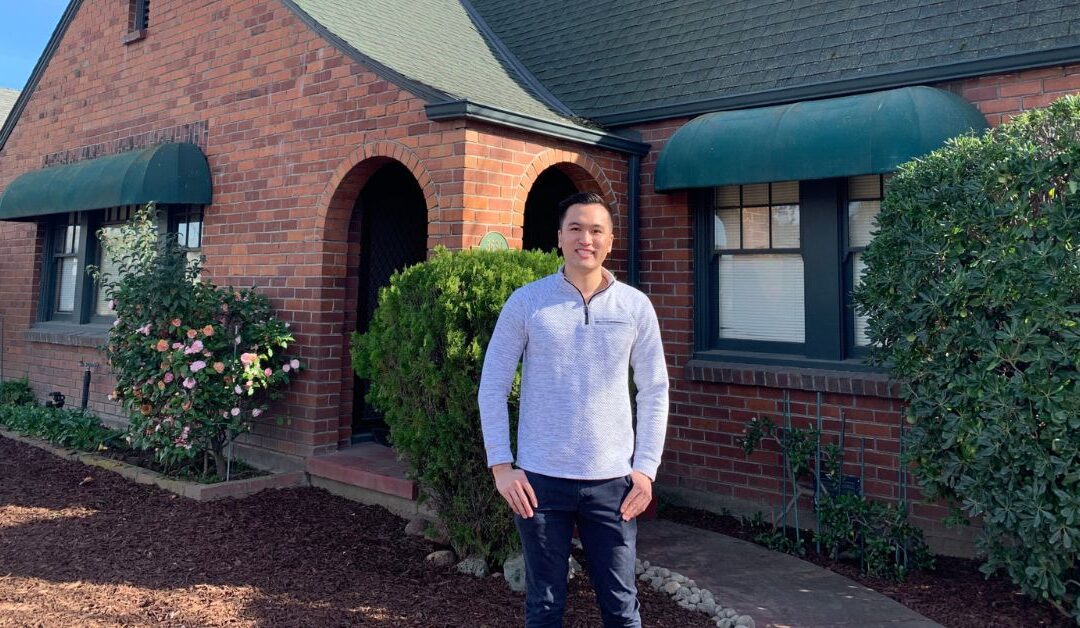Do you want to know how to start a student housing business?
That’s what you’ll learn today! Student housing is an excellent niche to invest in because it can give you financial stability in the long run – especially during an economic downturn.
Ready to find out why? Read on!
Why you should build a student housing business
Maybe you’re wondering, “Can investing in student housing actually work for me?”
Fair question.
The answer? Absolutely. The student housing investment market is a $10.1 billion market. Student housing rents also increased by 8.8% between 2021 and 2022. Vacancy levels are at 2.4%, down from 2.8% in 2021.
And I know how powerful a student housing business can be first hand because I’ve built my own profitable business. In fact, my rental income currently brings in multiple six figures a year in passive income.
Here’s my full story if you want to learn how I did it:
One great thing about the student housing model, in particular, is that students aren’t as picky about their lodging as high-income professionals might be.
After all, they’re in school, and they just want a safe and quiet room to study and sleep at.
Students will typically rent by the bedroom which allows you to make a higher ROI.
Plus, renting to the right students can be fulfilling.
By offering an affordable, off-campus housing option, you’re helping high-achievers save on student loans and reach their educational goals – while also giving yourself more financial security.
So, how exactly can you get started investing in student housing? That’s what we’ll look at next.
How to invest in your first property
Investing in your first property is a big step. You want to make sure you’re setting yourself up for success by doing your homework before you get started.
One way to do this? Before deciding on a property, contact a local real estate attorney to confirm that you’re legally allowed to start a student housing business in your area.
It’s always best to be on the safe side since restrictions do exist in some markets.
Study the market
Once you’ve done your homework on possible restrictions, do market research.
What do students in a particular location value most (walkability, affordability, and so on)?
What is the enrollment outlook for the local college/university?
And what are the housing options already available in the area?
Finding answers to these questions will help you identify (and fill) holes in the market.
Choose the right property
Overall, try to opt for a property that’s a few minutes’ drive away from campus.
However, do some research to see how many students have cars in the area and decide if you need to invest in a property that is at a walking distance from campus.
Also, check what kind of public transportation is available. If there are good options, you can invest in properties that aren’t right next to campus and still find tenants.
The best properties for student housing rentals
Your best bet is to pick large, recently-built houses to reduce the risk of having to deal with unexpected, costly repairs.
Yes, old houses tend to cost less initially, but the downside is that they come with a whole set of potential problems, like poor insulation, pest and mold issues, old pipes, and so on.
How do I know? Because I actually bought a one-hundred-year-old house myself. And it ended up needing over $30k in unexpected repairs!
So, my advice?
Stick with houses that are newer than the 1940s that are at least 1,500 sq/ft. That way, you’ll have space to convert extra rooms into bedrooms – and ultimately, increase your cash flow.
For my own student housing business, I also perform regular inspections to identify any issues and address them before they get bigger (and more expensive).
And in terms of the number of students you should house, plan to have three renters for every bathroom.
So, a six-bedroom, two-bath house could realistically house six students.
This ratio is a good balance: It gives everyone access to showers without creating bottlenecks, and it also gives you, the owner, the chance to charge competitive rates.
Research before making an investment decision
Make sure you do your research before investing in a property. Here are some questions you should know the answers to before signing on the dotted line:
- How much rent could this property bring in?
- What are the maintenance costs?
- What’s the cash-on-cash return (the amount you earn relative to your investment)?
- What’s the cap rate (a property’s yield over a year if it was not mortgaged)?
Finding the answers to these questions will help you know what you’re getting yourself into.
Attract ideal tenants
How can you find great tenants? There are different ways to go about it, but I personally use a method I called the PRIME method that works well.
Here’s what PRIME stands for:
P stands for ad placement. The idea is to advertise on sites where I know my target demographic is actively looking for student housing. For this, I’ve had success using sites like Roomies.com and Zillow.
R stands for review. This is where I do some research into prospective tenants’ presence on social media platforms to find out what kind of lifestyle they lead and if they do drugs, throw wild parties, and so on. This is an important step because it helps me figure out what they’d be like as renters.
I stands for identifying the tenant. Basically, this step is about trying to figure out if a prospective tenant has a good attitude and can get along well with others. Since student housing means tenants share common areas, it’s important to pick the right people.
M stands for measure of responsiveness. So, people who are good communicators, provide needed documentation when asked, and have a positive, professional attitude typically make great, responsible tenants.
And last but definitely not least, E stands for ensuring proof of income. When I’m evaluating a prospective tenant, I make sure to take a look at their parents’ financial background if they’re the co-signers.
Otherwise, I like to check student loan documents or financial aid packages to have a better idea of whether a prospective tenant could realistically afford rent or not.
Learn more about my process here:
Pick the best location for your first investment
Again, when you’re looking for the best location for your first student housing investment, research the market and go where your ideal tenants are.
For example, if you want to rent to mature students who won’t throw wild parties, look for college towns that attract a lot of high-achievers who are focused on getting an education.
Areas that have great medical schools and hospitals, like Miami or Boston, are ideal for this.
Ultimately, you can’t go wrong by choosing a place that attracts high-income earners, such as doctors and engineers.
Why? Because the better the quality of life a city provides, the more people want to move there, which increases the cost of living – including the rent you can charge and the home prices.
I talk more about picking the right location here:
Start your business
Once you have your first investment, you can start expanding your portfolio.
However, make sure you plan ahead for how to best build your company.
One question I often get is – should I make my company an LLC?
I actually don’t advise you to start there. Instead, buy your first property under your own name and then transfer it to an LLC later, if that’s the route you take.
That’s because lenders don’t usually lend to an entity and you need to secure that loan first to buy your property.
However, an LLC can come with many benefits such as reduced liability. So there are pros and cons.
If you’re interested in learning more, I talk about it here:
Over to you!
There you have it! Now you know how to start a student housing business.
As you can see, this is a great option to create a steady, long-term income stream for more financial stability.
And, since people tend to go back to school to reskill during economic downturns, this specific type of real estate investment is a solid choice in 2023.
Plus, once you have one successful rental, you can scale by reinvesting your profits, buying more properties, and repeating the process.
What’s the biggest reason you want to start a student housing business? Let me know in the comments!



I am from the Riverside California area, I may soon inherit property near the UCR college. I am very interested in housing mature students for business purposes and a healthy safe environment.